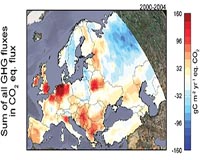 |
Palo Alto, CA (SPX) Apr 18, 2011 Scientists have known for decades that black carbon aerosols add to global warming. These airborne particles made of sooty carbon are believed to be among the largest man-made contributors to global warming because they absorb solar radiation and heat the atmosphere. New research from Carnegie's Long Cao and Ken Caldeira, along with colleagues George Ban-Weiss and Govindasamy Bala, quantifies how black carbon's impact on climate depends on its altitude in the atmosphere. Their work, published online by the journal Climate Dynamics, could have important implications for combating global climate change. Black carbon is emitted from diesel engines and burning wood, among other sources. In the atmosphere, it acts as an absorbing aerosol-a particle that absorbs the sun's heating rays. (Other types of aerosols reflect the sunlight back out into space, providing a cooling effect.) The climate effect of black carbon is difficult to quantify because these particles heat the air around them, affecting clouds even before they begin to heat the land and ocean surface. The team's research involved idealized simulations of adding a theoretical megatonne of black carbon uniformly around the globe at different altitudes in the atmosphere. They found that the addition of black carbon near the land and ocean surface caused the surface to heat. As the altitude of black carbon increased, surface warming decreased. The addition of black carbon to the stratosphere caused the land and oceans to cool. This cooling occurred despite the fact that the black carbon caused the Earth as a whole to absorb more energy from the sun. When black carbon is high in the atmosphere, it can lose its energy to space while helping to shade the land and ocean surface. "Black carbon lower in the atmosphere is more effective at warming the surface, even though black carbon particles at higher altitudes absorb more solar radiation," said Ban-Weiss, formerly of Carnegie and currently at Lawrence Berkeley National Laboratory. He continued: "Just analyzing instantaneous changes in absorption of radiation from black carbon cannot accurately predict changes in surface temperatures. If we want a consistent framework for predicting changes in surface air temperature from black carbon we need to account for rapid atmospheric responses in things like clouds." Black carbon also had varying effects on precipitation. In the lower layers it increased precipitation and in the upper layers it decreased precipitation, a result of changes in atmospheric stability. "We showed that black carbon near Earth's surface has the greatest effect on global warming. Unfortunately, this is exactly where we are putting most of the black carbon that we add to the atmosphere," Caldeira said. "This black carbon also often causes health problems, so cleaning up these emissions would help both the environment and human health." Major sources of black carbon emissions into the lower atmosphere include forest fires, cooking stoves, and emissions from trucks and automobiles. Aircraft are a notable source of emissions to the upper atmosphere. "This study points out the importance of understanding the complexities of how human activities affect the globe. If we want humans to live well while protecting the environment, we need to understand how our activities affect climate," Caldeira said.
Share This Article With Planet Earth
Related Links Carnegie Institution Carbon Worlds - where graphite, diamond, amorphous, fullerenes meet
 Europe pushes plans to hike diesel, coal taxation
Europe pushes plans to hike diesel, coal taxationBrussels (AFP) April 13, 2011 The European Commission pushed controversial plans Wednesday for a tax on carbon emissions to promote clean energy use by increasing the cost of dirty fuels such as coal and diesel. The aim is "to promote energy efficiency and consumption of more environmentally-friendly products," the European Union executive said. It would tax carbon dioxide emissions at 20 euros per tonne while also t ... read more |
|
| The content herein, unless otherwise known to be public domain, are Copyright 1995-2010 - SpaceDaily. AFP and UPI Wire Stories are copyright Agence France-Presse and United Press International. ESA Portal Reports are copyright European Space Agency. All NASA sourced material is public domain. Additional copyrights may apply in whole or part to other bona fide parties. Advertising does not imply endorsement,agreement or approval of any opinions, statements or information provided by SpaceDaily on any Web page published or hosted by SpaceDaily. Privacy Statement |